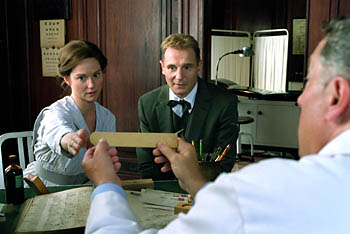|
Reviews of Recent Independent, Foreign, & Documentary Films in Theaters and DVD/Home Video
KINSEY
In what has quickly become the year of the biopic, the new film from director Bill Condon (Gods and
Monsters) follows the life of groundbreaking sex researcher Dr. Alfred Kinsey (Liam Neeson), tracing
the doctor's life from repressed youth to controversial author of Sexual Behavior in the Human
Male, which created a stir in 1940s conservative America. Condon is mainly interested in Kinsey as a
field worker, showing us that he didn't necessarily provide new information so much as revealed what was
simply not talked about at the time.
As the new instructor of biology at Indiana University, Kinsey, alarmed by the
lack of scientific data on sexual behavior, forms his own team of researchers. The
resulting confidential and nonjudgmental personal interviews comprise some of
Kinsey's most riveting moments. Soon enough, the doctor is teaching a highly
divisive class on sexual behavior (complete with overhead projections of both male and
female genitals). The film, like the professor, does not back away from its sexual
content. As a result of his research, Kinsey applies his observations of gall wasps to humans - "Everyone is
different."
The film has many great performances. Liam Neeson is remarkably cold and unemotional as a man
looking to find the root cause for the male sexual drive, and Peter Sarsgaard is both charming and
smarmy as Clyde Martin, the doctor's right-hand man who gains an overzealous appreciation for Kinsey
and his wife. Yet for all its great acting, and the admittedly humorous scenes of sexual irreverence, Kinsey
is strangely ineffective.
Recent films like Ray and The Sea Inside succeed in taking an intriguing figure and centering
the story on the man and not his circumstance. The problem with Kinsey is that its main
character is simply not that interesting, even as Neeson does what he can as a man unable to adequately
express his inner emotions. Perhaps that's why T.C. Boyle takes the opposite view of Kinsey in the novel The Inner Circle, by portraying him as a sexual manipulator.
However, Condon does make sure that this briskly-paced film, while never quite heartfelt, is at the very
least always entertaining. Most captivating of all is a final scene, an interview involving Lynn Redgrave as
an elderly lesbian. Her pitch-perfect monologue almost makes the viewer wish that they had just seen her
story rather than that of the stonewalled Kinsey. Michael Belkewitch
DVD Extras: Alfred Kinsey approached life rather methodologically, hence his non-judgmental behavior and
his dry social interactions. Bill Condon’s audio commentary contains a certain methodological
approach as well. Thankfully, Condon is not dry like his subject, but he tends to dampen his
commentary with too much focus on the actors and the process of filmmaking; it is often bland
compared to the historical significance and personal intricacies of the real-life Kinsey. There are
a few memorable facts about the overall production of this film, one being the initial intention to
have Ian McKellen narrate the story. But Condon speaks most provocatively when the film
reaches the revolutionary scientist’s downfall. It is then the filmmaker mentions the timing of the
film: it was released just after the 2004 presidential election, when one of its key issues dealt
with sexual tolerance - gay marriage. Condon says that today
Kinsey would be excited by the ground we’ve covered in sexual education and awareness, but
he would also notice how much we have stayed the same. He quotes a Kinsey biographer,
Jonathan Gathorne-Hardy, who said the US is “the most licentious culture since Rome” and
yet “the most puritanical culture ever invented.” Unfortunately, most of the commentary veers
away from talk like this. James Schwartz
|
